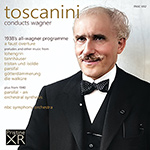
This album is included in the following sets:
This set contains the following albums:
- Producer's Note
- Full Track Listing
- Cover Art
Toscanini Ends His Air Series Here; Wildly Cheered in Wagner Farewell
Distinguished Audience Fills NBC Studio to Capacity for Two-Hour Program
By OLIN DOWNES
The eleventh and final Toscanini concert of this season with the NBC Symphony Orchestra, following the incomparable performance of Verdi’s Requiem given with the same orchestra the preceding evening at Carnegie Hall, took place last night in Studio H-8 in Radio City. One of the most distinguished audiences to have appeared at any concert of this series was in evidence. The pressure for invitations in advance of the event had been terrific, for these concerts have increased in interest and fascination for the public since they were inaugurated.
The tension of the audience before Toscanini appeared, the silence which deepens as the seconds pass, preceding his emergence onto the stage, are phenomena become, if anything, more striking than at the earlier concerts of the series. Then the minute hand of the clock which is now removed from the wall was watched as if ten were the hour of Judgment Day with all prepared to face its portents.
The homage of the audience when the maestro appeared was unmistakably the expression, as Mr. Sarnoff remarked in a speech made during the intermission, of love for him. And that is not an idle word. The same thing held true of the playing of the gentlemen of the orchestra, inspired to their utmost.
The program, instead of an hour and a half, was a full two hours in length, and it was devoted to Wagner. The playing was superlative, in its dramatic utterance, its. blaze of color and penetration to the heart of Wagner’s thrice familiar and everlasting wonderful music. To hear that music so interpreted is to marvel anew. It came white-hot from the master’s baton. The “Faust” overture is not played as much as other of the Wagner concert pieces. It is amazingly eloquent, prophetic, and it gives tormenting promise of what Wagner would have done if this overture had been, as he originally intended, the first movement of a "Faust” symphony.
The music, as it stands today, ranges from Wagner of the “Flying Dutchman” to the Wagner of the chromaticism of “Tristan and Isolde.” But psychologically, if not in thematic material, the overture is consistent and extremely eloquent of phases of Goethe's character, and this allied with a very clear mastery of the musical form.
The compositions that followed the "Faust” overture were the Preludes to Acts I and III of "Lohengrin”; the overture to "Tannhaeuser”; Prelude and Liebestod from "Tristan”; Prelude to "Parsifal”; Siegfried’s Rhine Journey from "Goetterdaemmerung,” and the Ride of the Valkyries, from “Walkuere.” This gave the orchestra every scope for some of its best playing of the season, as it afforded diverse aspects of Wagner’s incredible genius and of the greatness of his interpreter.
Mr. Toscanini appeared singularly in the vein. Never was he more sure and imperious, nor more completely the master of the molding of every phrase. He drew sonority upon sonority from the orchestra.
His rhythms were those of an ebb and flood of tone nearer akin to currents of the sea or air than to the ordered arrangements of a symphonic score. Perhaps the greatest tribute that can be paid is to say that the listener was taken breathless—with Wagner, not Toscanini.
When the last chord of the wild Valkyrie music had crashed the audience was very reluctant to go. There was cheering and applause, and long and patient awaiting till Toscanini re-appeared. The occasion might, as Mr. Sarnoff remarked, have been a melancholy leave taking. It was instead Arrivaderci till the NBC concerts of next season, in Radio City, in this city, and also, with the NBC Symphony, in different American cities.
All rejoiced in the presence of this pre-eminent musician, and the certainty that he is not to depart for any long interval from us. His position today, thanks to the vision and the broad policies which have brought him here, is more international and more predominant in his art than ever before.
NEW YORK TIMES, 6 MARCH 1938
TOSCANINI The 1938 Wagner Special & 1940 Parsifal Synthesis
disc one (78:09)
1. RADIO Introduction (5 March 1938) (3:31)
2. WAGNER A Faust Overture (12:29)
3. WAGNER Lohengrin - Prelude to Act 1 (8:56)
4. WAGNER Lohengrin - Prelude to Act 3 (3:44)
5. WAGNER Tannhäuser - Overture (15:08)
6. WAGNER Tristan und Isolde - Prelude and Liebestod (18:33)
7. WAGNER Parsifal - Prelude (15:50)
disc two (69:13)
1. WAGNER-TOSCANINI Götterdämmerung - Dawn and Siegfried's Rhine Journey (12:01)
2. WAGNER Die Walküre - Ride of the Valkyries (8:09)
3. WAGNER-TOSCANINI Parsifal - An Orchestral Synthesis (23 March 1940) (49:03)
NBC Symphony Orchestra
conducted by Arturo Toscanini
XR remastered in Ambient Stereo by Andrew Rose
Live broadcast recordings from Studio 8H, Radio City, New York, 1938 and 1940
Front cover artwork based on a photograph of Arturo Toscanini
Total duration: 2hr 27:22

